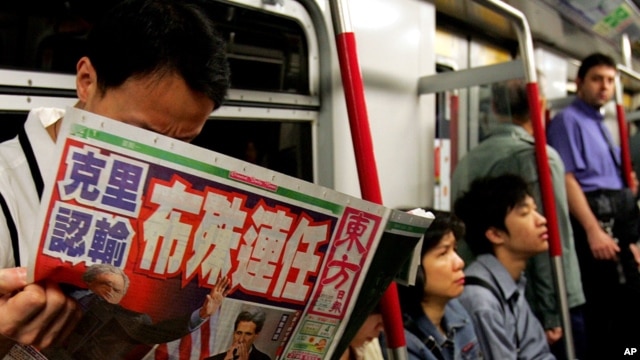
A man reads a newspaper reporting on U.S. presidential elections on a subway train in Hong Kong.
BEIJING — As the U.S. presidential election nears, Chinese news web sites and microblogs are following developments in the campaign closely, with cutting analysis and commentary - especially when China is a target of the criticism. In-depth coverage is in stark contrast to the little substantive reporting being done about China’s leadership reshuffle, also coming in November.
Just hours after President Barack Obama and his Republican opponent Mitt Romney held their second pre-election debate this week, Internet users in China could access translated and interpreted portions of their exchanges online.
On China’s Twitter-like microblog service Weibo, users not only shared remarks praising the candidates debating skills, but pondered what it meant for China.
One Weibo user, Zhou Peiyuan, argued that it was not necessarily a bad thing that China was the target of criticism, because that attention is more a reflection of China’s rise and influence than anything else.
Political scientist Xie Tao says that while many U.S. watchers in China are following the election debates for signs of shifts in American policy, there are many others who are more casually interested. “Some people just watch it because they are curious to see what these people [candidates] are doing, other people want to know what is actually debated,” he said.
Most state-backed media outlets reported that China was being used as a scapegoat in the debates, and accused the two candidates of engaging in China bashing.
Strong Nation Forum, a bulletin board run by the state-run newspaper People's Daily, noted that in the 20 times the two candidates mentioned China, it was always in reference to the state of the American economy.
Not only did state media balk at how China was portrayed, but commentaries also drew contrasts between the US and Chinese political systems.
Some microblog users wondered when the day would come that China’s leaders might hold televised debates to outline their policies and agenda.
That, however, is something that is unlikely anytime soon, says Joseph Cheng, a professor at the City University of Hong Kong.
Professor Cheng says that over the past 20 years, China has developed its own way of selecting its leaders, through an internal process where a small group of younger party members are promoted and groomed over a 10 year period. “That was the path of Hu Jintao and Wen Jiabao and that appears to be the path of leaders like [Vice President] Xi Jinping or [Vice Premier] Li Keqiang and so on,” he stated.
China is weeks away from its political transition, but unlike the U.S., there is little uncertainty about who will emerge as the country’s leaders.
During November's 18th party congress, the most prominent seats of power, those of China's president and premier, will most likely go to Xi Jinping and Li Keqiang. But much of their agenda and the names of those who will join the country's most powerful decision-making body, the Politburo's standing committee, remain unknown to the Chinese public.
On the same Chinese microblogs where users are sharing their thoughts about the U.S. presidential candidates, state censors block keywords such as “China's communist party”, or “18th party congress.”
Professor Cheng says that while China’s upper leadership does debate policies, the content of the discussions remains largely hidden. “What we can see is that there are publications, academic articles supporting or arguing for different orientations of reform directions, so we expect that these are the kind of issues being discussed at the top leadership level and these are the kind of corrections that they have to make decisions,”
Websites covering the U.S. elections, however, are likely to get even more traffic over the next week. In the final presidential debate that will take place in Florida on October 22, the candidates will discuss their thoughts on China during a segment titled “The Rise of China and tomorrow's world.” |
|
